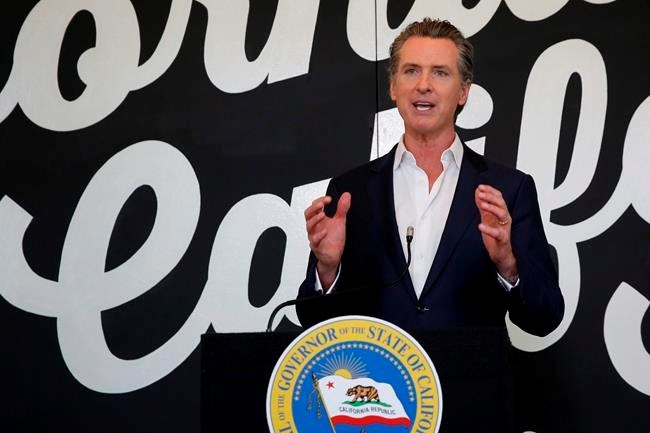SACRAMENTO, Calif. — California will have a budget shortfall of $54.3 billion because of the economic devastation wrought by the coronavirus, Gov. Gavin Newsom's administration announced Thursday, a stunning reversal for a state that had a $21 billion surplus a year ago.
The state has been under a mandatory stay-at-home order since mid-March, forcing nonessential businesses to close and prompting more than 4 million Californians to file for unemployment benefits. After recording record low unemployment of 3.9% at the start of the year, the Newsom administration now predicts a jobless rate of 18% for the nation's most populous state — 46% higher than the height of the Great Recession a decade ago.
Newsom called the numbers “more acute than anything we have seen in modern times." But he said the budget will be manageable “if the federal government helps support states like ours.”
It’s not yet clear what state programs will be cut or by how much. Newsom is scheduled to reveal his new spending proposal next week. But the revenue shortfall means the state’s constitutionally required funding level for public schools and community colleges will fall by $18.3 billion.
State funding accounts for 80% of most school district budgets, which are mostly spent on teacher and staff salaries, said Troy Flint, spokesman for the California Association of School Boards. He said the shortfall will “have a devastating impact on school staffing levels and the amount of services and programs that K-12 schools can offer to families."
Phil Ting, chairman of the budget committee int the state Assembly, said he doesn't think the state can cut enough spending to fill the budget hole and “may have to look at some additional revenue.”
Lawamkers are already considering a new tax on vaping, but new taxes will be difficult to pass at a time when so many people are out of work.
“It’s devastating because at a time when people need government the most, which is any recession, is also the time when we have limited ability to help,” Ting said.
The virus-induced business closures, unemployed workers and cratering of the restaurant, tourism and entertainment industries have resulted in a staggering loss of tax revenue for California. The Newsom administration projects personal income will fall by close to 9% for the state's nearly 40 million residents while permits for new housing construction — a key measure of the economy's health — will drop more than 21%.
After facing budget deficits of more than $40 billion following the Great Recession, California lawmakers have been saving money for the next economic downturn to try and avoid a repeat of cuts to state services. For the past 10 years, the state has had an unprecedented run of economic growth, adding more than 3.4 million new jobs.
That led to increased state spending and huge budget surpluses in recent years, pushing the state's “rainy day fund” to more than $16 billion. But the projected budget shortfall announced Thursday is nearly three-and-a half times that number. dispelling any notion of a quick recovery once the state's coronavirus restrictions are lifted.
The Newsom administration estimates state general fund revenues will decline by $41.2 billion compared with the $222.2 billion spending proposal Newsom revealed in January. Plus, California must pay for an extra $7.1 billion for increased
Another $6 billion in anticipated emergency spending on the coronavirus for things like protective gear, hotel rooms for the homeless and cash payments for low-income adults living in the country illegally pushes the projected deficit past $50 billion.
Meanwhile, lawmakers are already being asked to bail out the state's essential industries. California hospitals say they have lost up to $14 billion by postponing elective surgeries and other procedures to make room for an anticipated surge of coronavirus cases that never happened. On Monday, the California Hospital Association asked lawmakers for more than $1 billion in aid.
Local governments, reeling from disappearing sales and hotel tax revenue as millions of people stay inside, are also asking lawmakers for billions in aid.
California already is in line to receive more than $26 billion in federal aid because of the coronavirus, according to an analysis by the nonpartisan Legislative Analyst's Office. But in a memo released Thursday, the Newsom administration says the state's bleak financial outlook “underscores the necessity of further federal stimulus to help states and local governments.”
“The next few years we're going to have to work through these challenges,” Newsom said Wednesday. “But we'll work through them. And we'll get out the other side."
Adam Beam, The Associated Press

